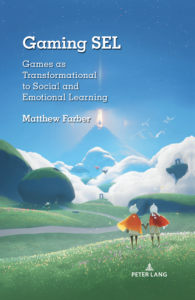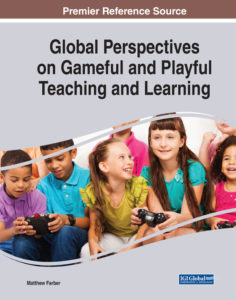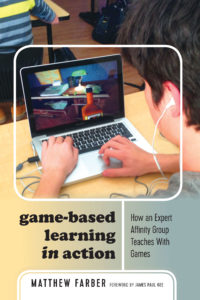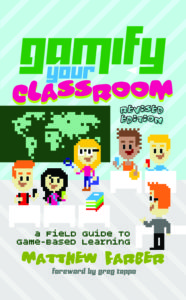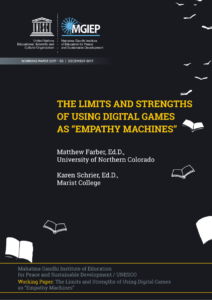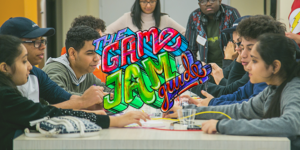
Matthew Farber, Ed.D. is an Associate Professor of educational technology at the University of Northern Colorado and the founder of the Gaming SEL Lab. His research is at the intersection of game-based learning (GBL) and social and emotional learning (SEL). He studies how playing and making games can cultivate empathy, perspective-taking, and ethical decision-making. He also works in youth initiatives around game design as a form of self-expression.
Dr. Farber has been invited to the White House, to keynote for UNESCO, and he has been interviewed about games and learning by NPR, The Washington Post, Fox News Radio, APA Monitor on Psychology, EdSurge, The Denver Post, The74, Fast Company, USA Today, and The Wall Street Journal. He is an advisor to Peekapak, Quandary (MIT’s Learning Games Network), Evolved Play, and Slam Out Loud, and has advised Noggin (Nickelodeon). He is also a frequent UNESCO MGIEP, iThrive Games Foundation, and Games for Change collaborator, an Edutopia contributor, a Certified BrainPOP Educator, and a member of the iCivics Educator Network.
___________________________________________________________________________
Gaming SEL: Games as Transformational to Social and Emotional Learning (Peter Lang, 2021)
Games enable children to practice emotions in spaces that are free from actualized consequences. With thoughtful guidance, games can help children manage emotions, perspective-take, demonstrate empathic concern, and exhibit prosocial behaviors.
Emerging research suggests that these competencies—also known as social and emotional learning (SEL) skills—are, in fact, teachable. In Gaming SEL: Games as Transformational to Social and Emotional Learning, Matthew Farber investigates the rich opportunities games have in supporting SEL skill development. Experts from the fields of education, game development, and SEL—including folks from CASEL, the Fred Rogers Center, Greater Good in Education, iThrive Games, Minecraft Education, and UNESCO MGIEP—share advice.
Games themselves cannot be responsible for children’s learning. Having a supportive educator or caregiver guiding experiences can be crucial. This book also includes recommendations for embedding games in classrooms in ways that support meaningful SEL skill development. Regardless of your experience, content area, or grade level, this book is for you!
Gaming SEL Companion Website: https://sites.google.com/view/gamingsel/home
___________________________________________________________________________
Rethinking Learning: A Review of Social and Emotional Learning for Education Systems (UNESCO MGIEP, 2020)
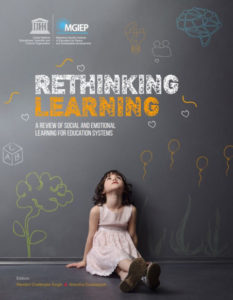
‘Rethinking Learning: A Review of Social and Emotional Learning for Education Systems’, was published by the UNESCO Mahatma Gandhi Institute of Education for Peace and Sustainable Development (MGIEP). It reviews the latest research on Social and Emotional Learning (SEL), its impact on student health and school climate and its transformative role in building happier classrooms. It seeks to inform and impress upon Member States the urgent need to mainstream social and emotional learning in education systems. Dr. Farber co-authored the chapter on leveraging technology for SEL programs.
___________________________________________________________________________
Global Perspectives on Gameful and Playful Teaching and Learning (IGI-Global, 2020)
In the fast-changing field of education, the incorporation of game-based learning has been increasing in order to promote more successful learning instruction. Improving the interaction between learning outcomes and motivation in games (both digital and analog) and promoting best practices for the integration of games in instructional settings are imperative for supporting student academic achievement.
Global Perspectives on Gameful and Playful Teaching and Learning is a collection of innovative research on the methods and applications that explore the cognitive and psychological aspects underpinning successful educational video games. While highlighting topics including nontraditional exercise, mobile computing, and interactive technologies, this book is ideally designed for teachers, curriculum developers, instructional designers, course designers, IT consultants, educational software developers, principals, school administrators, academicians, researchers, and students seeking current research on the design and integration of game-based learning environments.
___________________________________________________________________________
Game-Based Learning in Action: How an Expert Affinity Group Teaches with Games (Peter Lang, 2018)
How are expert educators using games in their classrooms to give students agency, while also teaching 21st-century skills, like empathy, systems thinking, and design thinking? This question has motivated Matthew Farber’s Game-Based Learning in Action: How an Expert Affinity Group Teaches with Games showcasing how one affinity group of K12 educators—known as “The Tribe”—teaches with games. They are transformational leaders outside the classroom, in communities of practice. They mentor and lead newcomers to game-based learning, as well as advise game developers, academics, and policymakers. Teachers in “The Tribe” do not teach in isolation—they share, support, and mentor each other in a community of practice. Farber shares his findings about the social practices of these educators. Game-Based Learning in Action details how the classrooms of expert game-based learning teachers function, from how they rollout games to how they assess learning outcomes.
There are plenty of lessons to be learned from the best practices of expert educators. These teachers use games to provide a shared meaningful experience for students. Games are often the focal point of instruction. Featuring a foreword from James Paul Gee—Mary Lou Fulton Presidential Professor of Literacy Studies, and Regents’ Professor—Farber comments on promises and challenges of game-based learning in 21st-century classrooms. If you are looking to innovate your classroom with playful and gameful learning practices, then Game-Based Learning in Action is for you!
___________________________________________________________________________
Gamify Your Classroom: A Field Guide to Game-Based Learning — Revised Edition (Peter Lang, 2017)
This completely revised and expanded field guide is packed with new innovative ideas on how to implement game-based learning and gamification techniques in everyday teaching. With nearly two dozen more experts than the first edition, this book contains interviews with more than 70 authorities in the field, including academics such as James Paul Gee, Kurt Squire, Mizuko (Mimi) Ito, Lee Sheldon, Jordan Shapiro, and Mary Flanagan. The author also shares conversations with experts from numerous organizations such as Common Sense Media, iCivics, DragonBox, Connected Camps, GlassLab Games, Schell Games, Institute of Play, Games for Change, BrainPOP, Tiggly, Toca Boca, ThinkFun, BrainQuake, Filament Games, BreakoutEDU, Kahoot, Classcraft, and more. Featuring a new introduction, as well as a foreword from USA Today’s national K-12 education writer Greg Toppo, this book provides new practical lesson plan ideas, ready-to-use games, and links for further research in each updated chapter. Included are best practice recommendations from star game-based learning teachers, including Steve Isaacs, Peggy Sheehy, Michael Matera, Rafranz Davis, Zack Gilbert, and Paul Darvasi. Regardless of your teaching discipline or grade level, whether you are new to game-based learning or if you have experience and want to take a deeper dive, this book will engage and reinvigorate the way you teach and how your students learn!
___________________________________________________________________________
The Limits and Strengths of Using Digital Games as “Empathy Machines” (UNESCO MGIEP, 2017)
Co-authored with Karen Schrier, Ed.D., this UNESCO MGIEP working paper grapples with questions related to the intersection of digital games and empathy. Many people are playing games—but are they also engaged in empathy-related skills such as perspective-taking, communication, reflection, relationship-building, and choice-making as part of their game playing? Are games “empathy machines” that support greater insight into our human condition? In this paper, we seek to (1) identify strengths and weaknesses of games in relation to empathy, (2) consider how player agency, transportation, perspective-taking, communication, and other factors may affect the practice of empathy, and (3) develop initial questions, guidelines, and recommendations for creating policies and programs around using games to inspire empathy.
___________________________________________________________________________
Game Jam Guide (Carnegie Mellon University ETC Press, 2017)
The Game Jam Guide debuted at the Games for Change Festival. It shares over 20 flexible lesson plans and new ideas from experts who led game jams in NYC that were focused on real-world issues. It is the culminating work of four Moveable Game Jams, funded by the Hive Digital Media Learning Fund through a Catalyst Grant in 2016. The game jams focused on three themes: climate change, smart cities, and immigrant history. The guide was developed and written by Kevin Miklasz from BrainPOP, Alex Fleming from Mouse and Sara Cornish from Games for Change, and Matthew Farber, Assistant Professor of Technology, Innovation and Pedagogy at the University of Northern Colorado. Game jam partners included Global Kids, Mouse, Institute of Play, Museum of the Moving Image, Brooklyn College Community Partnership, and CoderDojo NYC. This program reached over 1,000 students at events held in four NYC boroughs, which motivated NYC students to submit 400 original video games to the G4C Student Challenge.

